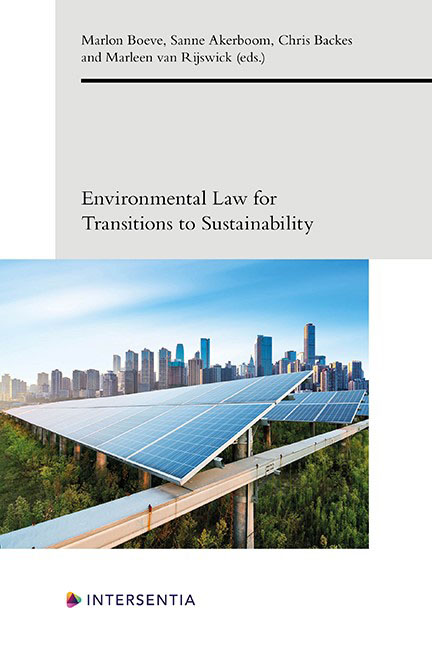Towards More Sustainable EU Environmental Law
Published online by Cambridge University Press: 11 November 2021
Summary
INTRODUCTION
Environmental law is characterised by its very broad subject and objective, requiring an overarching, global and long-term approach. The concept of sustainability fits in very well with this approach, as it is the basis for attaining the protection of ecological integrity, while both considering the capacity of the ecosystems (their natural assets and biological diversity) and acknowledging that humans are part of these ecosystems (considering present and future generations). A sustainability approach creates a bridge between the individual entitlement of humans to the environment and their responsibility for the commons. Sustainability is based on three pillars that should be balanced: people, planet and profit (i.e. social, environmental and economic concerns).
Although the principle of sustainability was introduced into European Union (EU) law over 20 years ago, it has not yet been fully implemented in environmental legislation. Fundamental issues in the approach to environmental law, both in recent times and during the first stages of development of environmental legislation, still hamper an actually sustainable policy. Overall, there seems to be an imbalance between the three sustainability pillars. This includes issues of compartmentalisation, fragmentation and an overall anthropocentric view on the environment. The concept of environmental reductionism also arises in this discussion, or as Klaus Bosselmann puts it ‘a number of trees have been saved, but the forest is disappearing’.
The main research question in this contribution is: Which options exist to fully implement the concept of sustainability in EU environmental law ? This question falls within the general theme of the conference book, as it concerns the role that environmental law can play in the fundamental transition to a sustainable future. First, the introduction of the concept of sustainability in EU environmental legislation is discussed, including the past and planned steps towards the implementation of this principle to attain a more sustainable EU environmental policy. The chapter will assess several specific examples of what has already been achieved and question whether these initiatives have indeed led to more sustainability. This includes discussing the theory and intentions behind these initiatives, but also looking into their value in practice.
- Type
- Chapter
- Information
- Environmental Law for Transitions to Sustainability , pp. 11 - 28Publisher: IntersentiaPrint publication year: 2021



